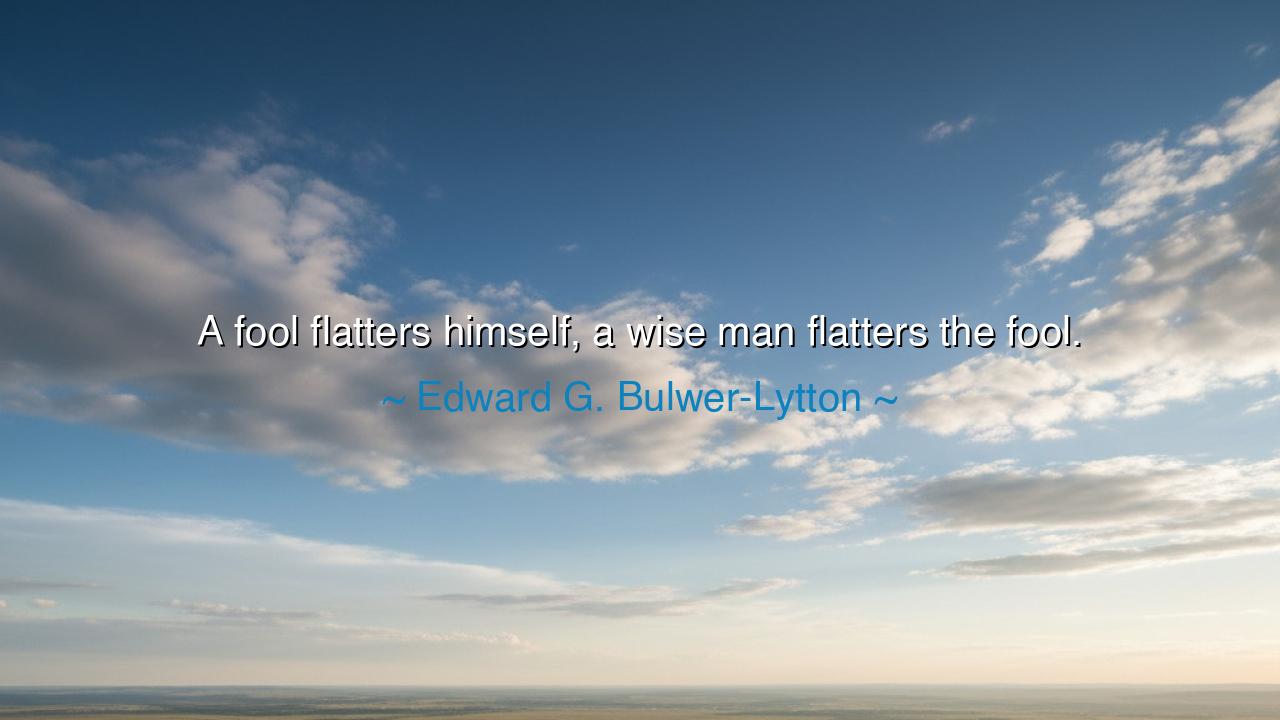
A fool flatters himself, a wise man flatters the fool.






Flattery is a subtle weapon, wielded both by fools and by the wise, though for very different purposes. When Edward G. Bulwer-Lytton declared, “A fool flatters himself, a wise man flatters the fool,” he unveiled a profound lesson on pride, manipulation, and the dynamics of power. The fool, blinded by arrogance, fills his own heart with empty praise, imagining himself great without reason. The wise, however, see the fool clearly and may choose to flatter him outwardly, not from admiration, but as a tool to guide, control, or survive in a world where folly often holds sway.
At the heart of this quote lies the truth of self-deception. The fool, lost in his illusions, does not need the praise of others, for he is already drunk on his own. His flattery is inward, a chorus of falsehoods that blinds him to his weaknesses. The wise man, understanding human nature, uses this weakness to his advantage. By flattering the fool, he gains influence over him, either to prevent harm or to turn his destructive energy toward a useful end. It is a delicate dance, requiring subtlety and restraint, for to openly challenge the fool would provoke anger and chaos.
History offers a vivid example in the court of Catherine the Great of Russia. Surrounded by nobles and generals, some of whom were vain and foolish, she often employed charm and calculated flattery to keep them loyal while pursuing her true political aims. By praising their egos, she masked her superior intellect and maintained stability in a volatile court. In this way, she embodied the wisdom Bulwer-Lytton describes: using flattery as a tool, not as a reflection of truth, but as a means to guide those blinded by self-love.
Conversely, the first part of the quote warns of the fool’s greatest danger: self-flattery. Consider the fall of Napoleon Bonaparte, who, in his later years, surrounded himself with courtiers who fed his pride. Eventually, he began to believe entirely in his own invincibility. His march into Russia was not merely a military gamble but the act of a man deceived by his own inner flattery. This blindness led to disaster, showing how self-praise, untempered by humility, can destroy even the mightiest.
On a personal level, this wisdom applies to everyday life. Many people are tempted to see themselves as wiser or more virtuous than they truly are. The path of wisdom demands self-awareness and the courage to silence false praise within the heart. At the same time, there are moments when flattery, used gently, can soothe tensions, win trust, or protect oneself from harm. The key is intention: whether flattery serves truth and harmony, or whether it deepens deceit.
Let this lesson echo through the ages: the fool is enslaved by his own illusions, while the wise man sees illusions for what they are and bends them to higher purposes. As Bulwer-Lytton teaches, beware of flattering yourself, for it leads to ruin. But when confronted with folly in others, sometimes the gentlest way to lead is not through confrontation, but through carefully chosen words that turn pride into a tool for the greater good.






VVLe nguyẽn Vy Vy
This quote has a kind of cynical wisdom to it. The idea that wisdom often involves playing to someone’s ego, even if that person is a fool, is interesting but a little unsettling. I can see how it might be useful in certain social or professional situations, but I wonder: does this approach ever backfire? Can a fool ever recognize when they’re being flattered, and how does that impact the relationship in the long term?
PNPhuong Nguyen
I’m intrigued by this perspective. It’s almost as if Edward G. Bulwer-Lytton is suggesting that the fool’s ego is so fragile that it needs constant reinforcement, while the wise person sees the bigger picture and uses flattery as a tool. But I wonder, is flattery the only way to deal with foolishness? Are there other ways the wise might handle someone who overestimates their own importance without resorting to flattery?
QBNg Quoc Bao
I find this quote a little ironic. On one hand, it seems like the wise person is playing a strategic game, using flattery as a tool. But on the other hand, it could also mean that the wise person is aware of the fool’s pride and knows how to deal with it. Is this kind of manipulation healthy or strategic? Or does it make you wonder how much wisdom is tied to playing people’s egos?
NCNguyen Ngoc Chau
This quote really makes me think about how power dynamics often work in social settings. The idea that a wise person would flatter a fool to gain something, like favor or influence, is fascinating. It makes me wonder if we, too, engage in flattery to manipulate situations or to gain something we want. Is flattery always a form of manipulation, or can it sometimes be genuine, even when directed at someone who doesn’t deserve it?